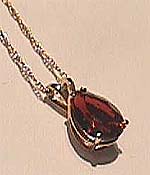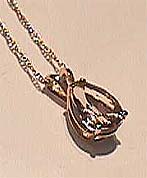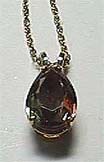A free gemology reference site
Gemology, gemstones, minerals and more
The Gemstones
Andalusite
Consumer Information
What color is it?: As shown by the photograph
above, andalusite is a combination of two to three colors, depending
on how you look at it. The two basic colors are green and brown
as shown above. But later down this page I will show you something
very unusual about this stone.
What is the story
behind this gemstone?: This
gemstone is a bit like tanzanite in that it shows two very distinct
colors at the same time. The difference is that andalusite shows
brown and green, rather than blue and purple of tanzanite. But
the ability for any gemstone to split a single beam of light
into these two very different colors that your eye can actually
see is very, very rare in the gemstone world.
Can I wear it everyday?: Yes, andalusite is a very
durable gemstone for wear.
Is it expensive?: It can be. A fine quality
andalusite can be a bit difficult to find and a bit pricey when
you do. But it is well worth the effort and the price. Nothing
else like it in the gemstone world. And you will certainly have
something no one else on the block owns.
Is it a birthstone?: No
What do I need to
know before going shopping?: Just be sure to call ahead. This is not a gemstone that many
jewelers will carry. But the stones are available so don't hesitate
to ask. But....look at the following photographs...

 General
Information
General
Information
FGA students please
look carefully at the above photographs. This is a different view of the same
andalusite shown at the top of this page...only looking through
a London dichroscope. Notice the change. From this direction
the stone appears a rather intense brownish red, but when the
polaroid filter is moved the gemstone turns colorless. This is
the very same stone in the very same position...I promise. Too
many gemologists expect andalusite to have brown/green trichroic
colors. This is not always the case when you look at different
directions. A stone just like this one cost me almost an hour
on my practical exam for my FGA diploma because I did not consider
that andalusite could be colorless and reddish brown. Look at
the gemstone in the top of this page. Then compare then two stones
shown above. And remember.....they are all three the same
stone. Words to the wise from one who has been there...done
that. Robert James FGA, GG
Source: Brazil, Sri Lanka, Canada,
Russia, USA
Chemical: Al2SiO5 aluminum silicate
Formation: In pegmatite dikes and granite
rocks
Crystal System: Orthorhombic
Unusual Properties: Extreme pleochroism
unlike any other gemstone
Gemological information on this page has been provided by the

